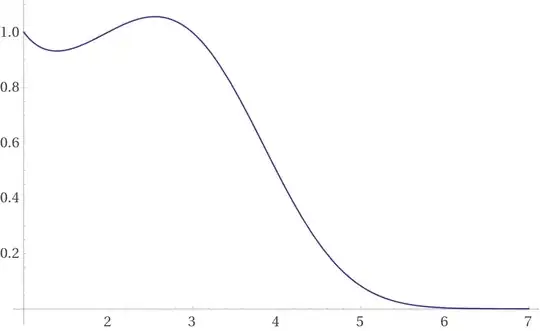I thought this problem would be arbitrary, but is really easier to calculate than the inspiration for this question:
Evaluating $\sum\limits_{x=2}^\infty \dfrac{1}{!x}$ in exact form.
Now our problem will include the Barnes G$(n)$, K, Hyperfactorial H$(n)$,functions. It also has OEIS entry A$287013$:
$$\sum_\Bbb N \frac 1{\text G(n)}=\sum_{n=1}^\infty \frac1{\text G(n)}=\frac 1{\text G(1)}+ \frac 1{\text G(2)}+ \frac 1{\text G(3)}+ \sum_{n=4}^\infty \frac1{\text G(n)} =3+ \sum_{n=4}^\infty \frac1{\text G(n)}\\ =3+\sum_{n=4}^\infty\frac{\text K(n)}{\Gamma^{n-1}(n)}=\sum\frac{\text H(n-1)}{\Gamma^{n-1}(n)}=3+\sum_{n=3}^\infty \frac1{\prod\limits_{k=1}^{n-1} k!}=3+\sum_{n=3}^\infty\prod_{k=0}^{n-1}\frac1{k!}\\ =3+\sum_{n=4}^\infty \frac1{1!2!\cdots(n-2)!(n-1)!}= 3.5868345309364719014988474…$$
Here is a graph of our summand:

Now remember the definition of the Regularized Generalized Hypergeometric function with the Pochhammer Symbol:
$$\,_p \mathrm{\tilde F}_q(a_1,…,a_p;b_1,…,b_q;z)\mathop=^\text{def}\sum_{k=0}\frac{\prod_{j=1}^p \left(a_j\right)_nz^k}{k!\prod_{j=1}^q\Gamma(k+b_j)}$$
Let’s try the following:
$$3+\sum_{n=4}^\infty \frac1{1!2!\cdots(n-2)!(n-1)!}= 3+\frac1{1!2!\cdots}\sum_{n=4}^\infty \frac{(1)_n 1^n}{\cdots\Gamma(n-2)\Gamma(n-1)\Gamma(n-0)n!} $$
Therefore I conjecture that:
$$\sum_\Bbb N \frac1{\text G(x)}= 3+\,_1 \rm{\tilde F}_q(1;…,-1,0;1)$$
but how would I put $$3+\sum_{n=4}^\infty \frac1{1!2!\cdots(n-2)!(n-1)!}$$ into closed form as the “$n-1$” amount of factorials would be a pain to evaluate in the sum? A closed form is optional, so alternate forms are appreciated Please correct me and give me feedback!
Actually, our conjecture is suppported by this computation:
$$3+\sum_{n=4}^\infty \frac1{\text G(n)}≈3+\,_1\rm{\tilde F}_3(1;-2,-1,0;1)=3+\,_1\rm{\tilde F}_3(1;-3,-2,-1;1)\mathop=^{N\in\Bbb N }3+\,_1\rm{\tilde F}_3(1;N-2,N-1,N;1)= 3+\frac{\,_0\rm F_2(2,3;1)}2= 3.5868639104823…$$
It is also possible to write the following using this computation and the Digamma function:
$$\sum_{n=1}^\infty \frac1{\text G(x)}=-\int_1^\infty\lfloor x\rfloor d\left(\frac1{\text G(x)}\right)= \frac{\ln(2\pi)+1}{2}\int_1^\infty \frac{\lfloor x\rfloor}{\text G(x)}dx-\int_1^\infty \frac{\lfloor x\rfloor x}{\text G(x)}dx+\int_1^\infty\frac{\lfloor x\rfloor xψ(x)}{\text G(x)}dx-\int_1^\infty\frac{\lfloor x\rfloorψ(x)}{\text G(x)}dx$$